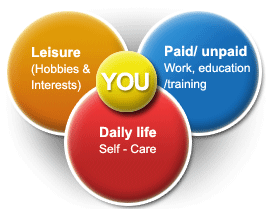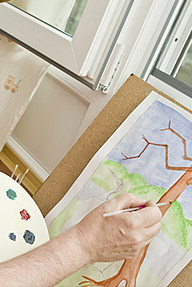 Departments
Departments
Occupational Therapy
What is Occupational Therapy?
Occupational therapy is a client-centred health profession concerned with promoting health and well-being through occupation.
...............................................................................................................................................................................The primary goal of occupational therapy is to enable people to participate successfully in the activities of everyday life. Occupational therapists (OTs) achieve this outcome by enabling people to do things that will enhance their ability to live meaningful lives or by modifying the environment to better support participation (World Federation of Occupational Therapists).
 Focus
of Occupational Therapy:
Focus
of Occupational Therapy:
Occupational Therapists work with clients to enable them carry out everyday tasks or activities in the environment in which they live, work and socialise. These activities can be categorised within the areas of work, leisure and self-care (see diagram). The occupational therapist assists the client in identifying areas of their life where they would like to initiate changes, and provides support and assistance for the client in initiating these changes. The overall aim of OT is to enable individuals to lead a meaningful and fulfilling life.
How can you be referred to the Occupational Therapist?
If you feel that you would benefit from Occupational Therapy input, please speak to your psychiatrist, nurse or social worker, who will be able to make a referral to Occupational Therapy, on your behalf.
What can you expect from Occupational Therapy?
Occupational Therapy is concerned with how your mental health difficulties affect your ability to do the things you want to do to make your life satisfying and meaningful. The Occupational Therapist will help to assess the areas in which you are experiencing difficulties, and form a therapy intervention plan with you, that will aim to help you to achieve your personal goals.
Group and/or individual therapy may include:
Community Living Skills:
Cooking, budgeting, developing a daily routine, personal care, shopping,
household management, healthy lifestyle.
Personal Development:
Goal setting, communication skills, coping skills, stress management,
anxiety management, assertiveness training, confidence building, social skills
training.
Vocational Exploration
Exploring work and education options.
Leisure
Exploring or taking part in leisure activities that you enjoy.
Cognitive abilities
Assessing or improving your memory or concentration.

